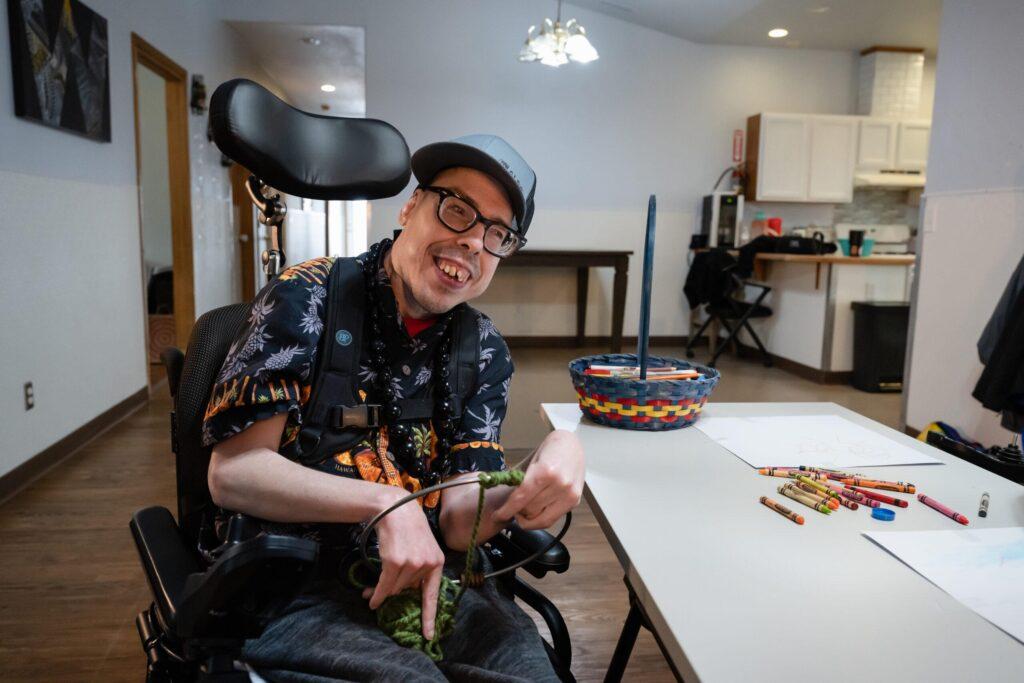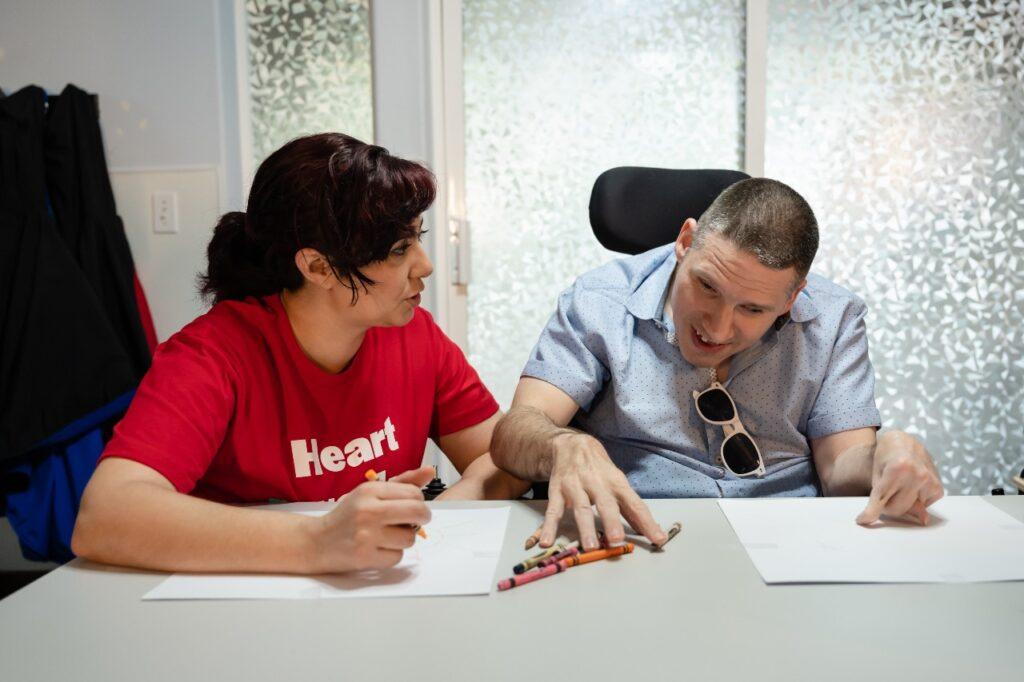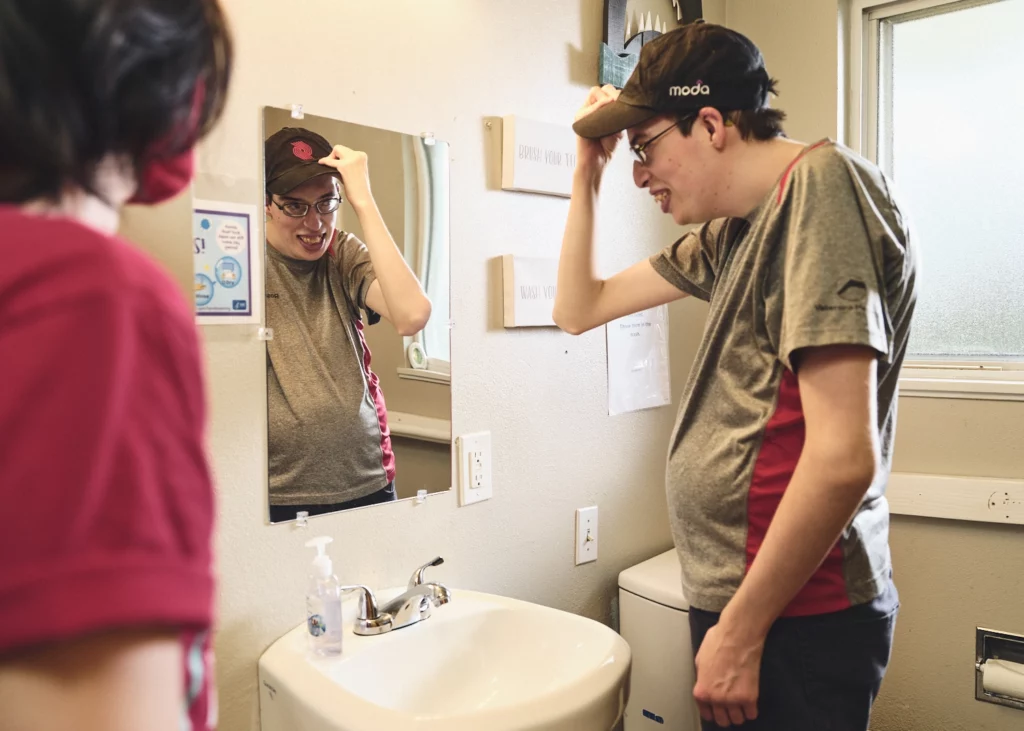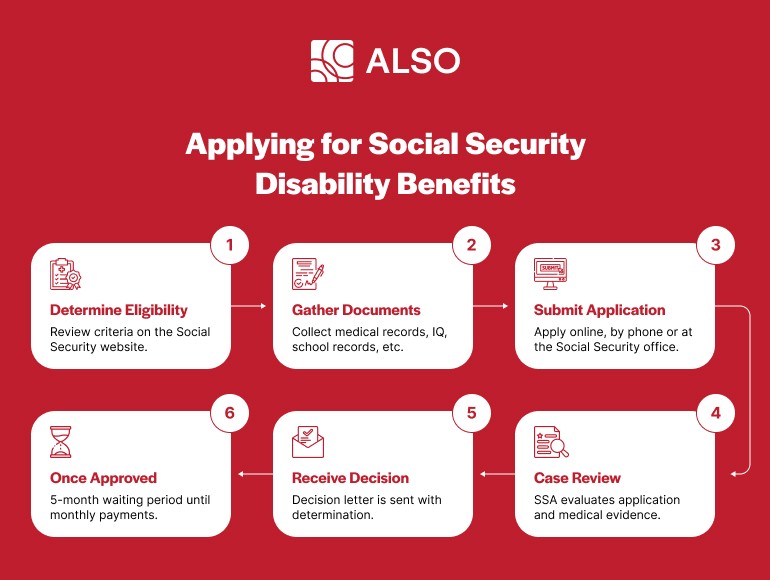Explore the ALSO Children’s Homes Wishlist and help fill the season with joy for the children supported by ALSO.
Explore the ALSO Children’s Homes Wishlist and help fill the season with joy for the children supported by ALSO.

Are you in the process of applying for Social Security disability benefits for yourself or a loved one? Are you overwhelmed? Confused? Stressed-out?
This is totally understandable. After all, there’s a lot riding on the success of your applications. Many fears might be going through your mind, such as:
It’s a daunting task, even for those who are experienced in applying for other types of benefits. ALSO has provided support services for people with intellectual and developmental disabilities (I/DD) throughout Oregon for over 25 years. We definitely understand the necessity of financial resources that help those with I/DD live and thrive in their least restrictive environment.
Please read on to better understand SSDI (Social Security Disability Insurance), and SSI (Supplemental Security Income). These programs could apply to people with I/DD as well as those with other types of disabilities.
We’ll get into the details of the step-by-step application process, eligibility criteria, and other topics related to Oregon benefits. Additionally, we’ll let you know who you can contact to ask questions.

SSDI is a federal health insurance program for people with disabilities and those who are 65 or older. In order to get SSDI benefits, a person must have a work history and paid social security taxes. It pays benefits to you as well as to members of your family if there are enough work years to qualify. Monthly benefits are based on the beneficiary’s earnings (or earnings of a spouse/parents). Those who have a disability or have a visual impairment that classifies them as ‘blind’ may be eligible to receive SSDI benefits.
In contrast to SSDI, SSI (also a federal program) doesn’t require a work history. It makes monthly payments to those with limited income and/or resources. These cash benefits can be used for basic living expenses (e.g. food, clothing, rent). Individuals with disabilities or visual impairments that classify them as ‘blind’ are eligible to receive SSI benefits.
Yes. This would be called ‘concurrent benefits.’ It depends on whether someone meets eligibility criteria for both programs.
Those with intellectual and developmental disabilities are more likely to get SSI only. However, they could additionally qualify for SSDI if they meet work and other requirements.
The definition of statutorily ‘blind’ can be complicated. Generally, a person is considered blind if their vision is no better than 20/200 in the better eye with corrective lenses. SSA also considers whether a person has a visual field deficit.
ADDITIONAL RESOURCE: Statutory Blindness – Title II and Title XVI.
Medical eligibility requires that the individual meet the SSA (Social Security Administration) definition of disability. Other criteria are severity, duration, and impact on function.
In determining eligibility for SSDI, the SSA also considers SGA (Substantial Gainful Activity).SGA involves significant mental or physical activity. The work is done for pay or profit, OR is usually done for pay or profit, regardless of whether pay/profit occurs.

According to the SSA, adults (18 or over) are considered to have a disability if they have a medically determinable physical or mental impairment (or combination) that:
For children, those younger than 18, disability means they have a medically determinable physical or mental impairment (or combination) that:
SSDI requires a specific level of Social Security work credits and a limited ability to do SGA. In 2025, earnings must be no more than $1,620 per month. If an individual has a disability and is also considered blind, their monthly cap is higher at $2700.00 per month.
According to the Disability Approval Guide, which collected data from the SSA, the national average SSDI amount (as of August 2024) was about $1,580 per month. Oregon residents who had newly been awarded benefits within the previous year received an average of $1,691.39 monthly.
Children and adults may be eligible for SSI if they have:
***The SSA views ‘little or no’ income or resources as $2,000 for an individual and $3,000 for a couple.
According to the 2025 document, Benefits for Children with Disabilities, for some medical conditions SSI payments might be made right away. Just a few of these are:
LEARN MORE: Read the entire 2025 document — Benefits for Children with Disabilities.
According to the Social Security Administration, the maximum amounts received from SSI are $967.00 for an individual and $1,450.00 for a couple.
*** Very Important Point – The above figures for SSI payments are maximums. Monthly payments are decreased for any number of reasons, including whether the person earns some kind of income, has non-work income, or lives with family members.
Although SSI and SSDI are helpful for those with I/DD, the limitations and earnings caps can still cause financial strain for the individual and their families. This is why, in 2014, congress enacted the law: Achieving a Better Life Experience (ABLE). It is a savings and/or investment option for individuals with disabilities who qualify.

The ABLE Act allows persons with disabilities tax-free savings accounts so they can pay for qualified expenses. Although the ABLE Act currently applies to people whose disability began before the age of 26
Just a few of the expenses that qualify include:
If you’d like to learn more about opening an ABLE account, check out the following resources:
To start the application process, first go to the Oregon Department of Human Services page on Federal Disability Benefits. On this page you’ll find a phone number if you wish to apply over the phone (1-800-772-1213). This same page provides instructions to apply online or in-person at a local SSA office.
Oregon has a specific office called Disability Determination Services (DDS) that will decide on eligibility. Applicants are welcome to call the DDS at 800-452-2147 to check application status.
Average wait times for disability determination in Oregon (like all other states) can be lengthy: 284 days. If an ALJ (Administrative Law Judge) hearing is requested after a denial, the average wait time in Portland, Oregon for cases closed during May 2025 is 8 months.

Use the eligibility criteria above as an initial guideline. You can also check out this official website of the US government:
https://www.usa.gov/social-security-disability
You’ll find a review of eligibility requirements and several frequently asked questions (FAQs). There’s also a number you can call to speak to a live agent:
***Call toll-free from the U.S. or Canada 1-844-USA-GOV1 (1-844-872-4681)
SSA will ask you for detailed information about the medical condition and how it affects function. Gather medical records, IQ and other evaluations, treatment histories, school records, and details on daily functioning. SSA will also ask for permission to contact all doctors, teachers, therapists, etc. to ask for additional information.
You can apply for both SSI and SSDI.
Sometimes the hardest part is taking the first step! You can begin the process by phoning 1-800-772-1213. An online application process is also available.
Have this information on-hand:
It would be totally understandable if you feel like you need additional support to navigate SSI and SSDI benefit applications. Perhaps you’re having trouble getting started, or you may have received a denial and want to appeal the decision. For situations such as these, you may wish to contact the governmental resources that are listed in this blog such as USA.gov call line: 1-844-872-4681.
There are likely legal and non-profit resources available in your home state that offer assistance.
The agency may feel it necessary to ask for an additional consultative examination if they need further medical evidence to make a determination. If this is necessary, SSA pays for the exam or the test. State agencies may take approximately 6 to 8 months to decide if a child meets the criteria for disability.
After approval of SSDI, there is typically a mandatory 5-month waiting period from the date that the disability began (onset date) to when monthly payments begin. Medicare benefits will become effective 24 months after the onset date.
For SSI, you’ll be owed payments by SSA from the month after the completed SSI application.
LEARN MORE: SSI and SSDI Payment Dates for 2025 (and how they are chosen).
Even with federal benefits, recipients continue to face financial need and other challenges. Fortunately, Oregon provides additional resources for its residents. Check out these resources and contact information.
In addition to understanding the main differences between SSI and SSDI, we recommend that you review the steps of the application process:
Finally, the team at ALSO emphasizes the importance of periodic review of the regulations, maximum amounts, and available resources. As with anything else, things change, and it’s important to try to stay as well-informed as possible.
Undoubtedly, the most important thing to remember as you delve into the SSI and SSDI application process is that, with the right support, you can do this. In our experience as a premier provider of disability programs for individuals with intellectual and developmental disabilities in Oregon, we have seen families and advocates pull together to create an excellent future for their loved one with intellectual and developmental disabilities.
Sources

Sign up for our newsletter to get our latest news, content, and job opportunities.
Help us ensure that everyone has the same opportunities in their home, workplace and community. Let’s make dreams!
